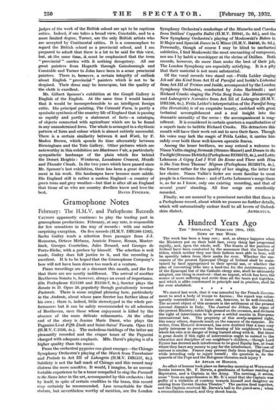A Hundred Years Ago
THE " SPECTATOR," FEBRUARY 18m, 1832.
NEws OP THE WEER.
The week has been a busy one ; and, as always happens when the Ministers put on their bold face, every thing has progressed rapidly, and, upon the whole, well. The hearts of the patriots of Ireland have been comforted by the assurance that the burden of tithes, which neither they nor their fathers were able to bear, will be speedily taken from their necks for ever. Whether the suc- cessors of the present Episcopal Clergy of Ireland shall be main- tained by land appropriated to their special use, or whether the plan of converting tithe into a land-tax for the maintenance, not of the Episcopal but of the Catholic clergy also, shall be ultimately adopted, one thing is resolved—that an impost, which has been the source of more suffering and strife than all the taxes put together, and which is alike condemned in principle and in practice, shall be for ever abolished.
• • * •
We stated last week, that it was intended by the French Govern. ment to send a body of troops to Ancona ; the report was subse- quently contradicted ; it turns out, however, to be well-founded: The avowed object of this measure is the settlement of the present internal disputes in Italy. The Journal dee Debate, the organ of the present Ministry, takes high ground on the occasion, and declares the right of intervention to be now a settled maxim in European international law. The propriety of this newly-acquired right, like many others, depends much on the manner of its ege rise. No writer, from HORACE downward, has ever doubted that e. man may justly interpose to prevent the burning of his neighbour's house, where his own is in danger of being burned along with it. But there is great doubt if this right of intervention ought to extend to the education and discipline of our neighbour's children,—though Lord ELDON has decreed such interference to be good Equity law, at least whore they have any money to pay for the interference. The case of nations is similar. France may prevent Italy from injuring France while intending only to injure herself ; the question is, do the quarrels of the Pope and the Bolognese threaten such injury ?
Ax Arrant OP HONOUR.
An affair of honour took place on Saturday morning at Wormwood Scrubs between Mr. F. Barwie, a gentleman of fortune residing at Bayswater, and a Captain in the Army. The meeting, it seems, arose " from an apprehension in Mr. B.'a mind that the Captain was guilty of a violation of courtesy towards himself and daughter on
retiring from Covent Garden Theatre." The parties fired together, and the Captain received Mr. Barwis's ball in the pistol-arm ; when a reconciliation ensued, and they shook hands.






































 Previous page
Previous page